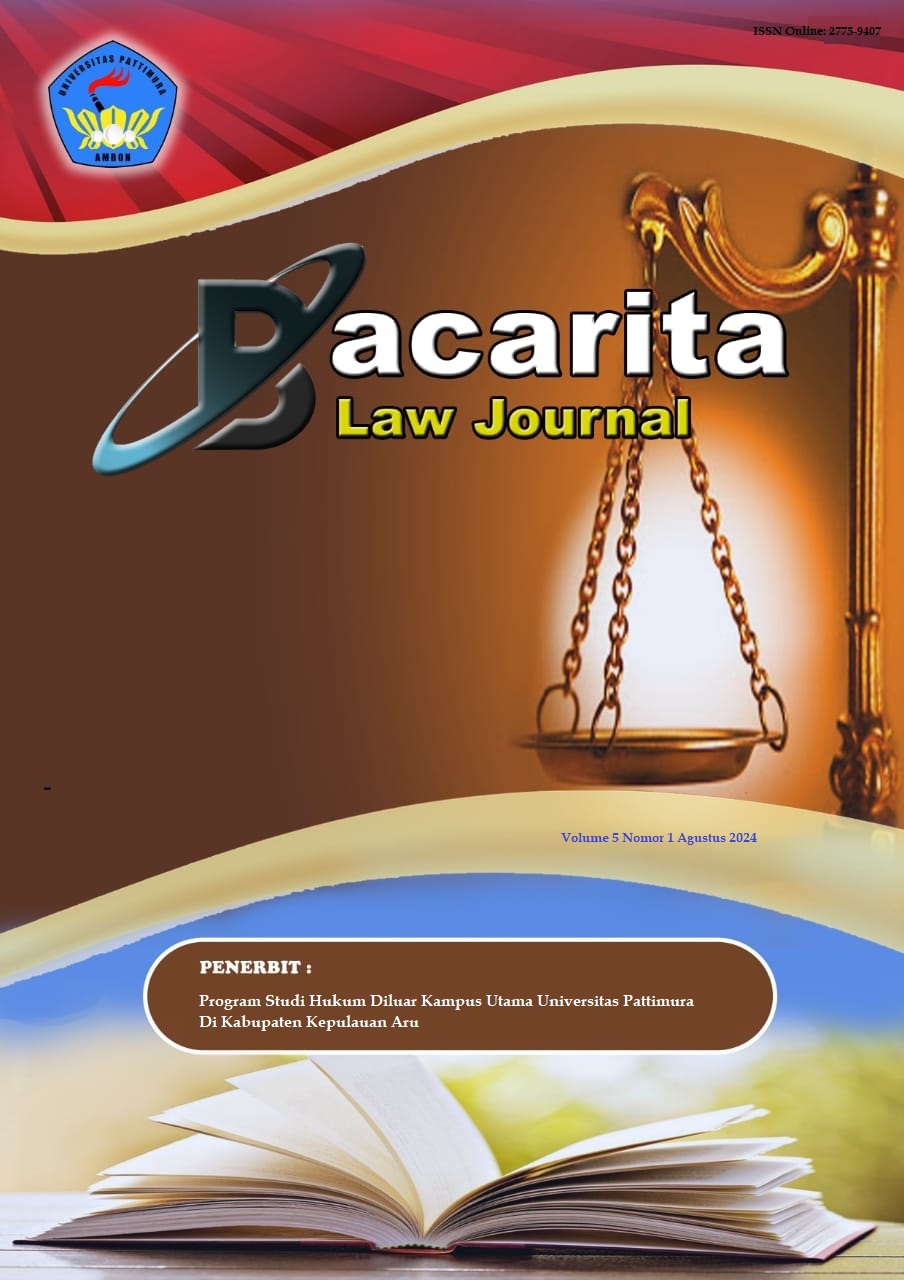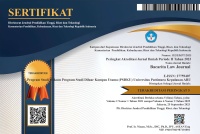Criminal Law Policy in Tackling Personal Possession of Marijuana for Medicine
Abstract
The problem of personal possession of marijuana for medical purposes because according to the mandate of the constitution the right to life is guaranteed by the 1945 Constitution. The purpose of this study is to identify problems from the formulation aspect of the Narcotics Law to determine the appropriate criminal law policy to overcome these legal issues. This study uses a type of normative juridical research with a qualitative approach. The results of the study show that the Narcotics Law has a vagueness of norms that results in a person who has marijuana personally for treatment or therapy can be criminalized, even though if you look at the formulation of the Narcotics Law does not really prohibit it as long as it is in accordance with the results of research so that its use can be scientifically proven. In addition to the incessant eradication of narcotics trafficking and abuse, the government needs to take policies by revising the Narcotics Law. Efforts that can be made by decriminalizing personal possession of marijuana as a treatment does not mean that it will be impossible in the future, coupled with the regulation and supervision of marijuana trafficking, will open up space for the courts to focus on dealing with more serious narcotics crimes. This means that the government must be present to refocus the function of legislation and determine future regulations to regulate the maximum limit on the amount of psychotropic substances that can be legally owned or not so that they can distinguish the perpetrators of criminal acts whether they are categorized as owners, users, storers or dealers and the certainty of psychotropic abuse in order to achieve certainty, justice and usefulness.
Downloads
References
Barda Nawawi Arief, Bunga Rampai Kebijakan Hukum Pidana, Bandung: Citra Aditya Bakti, 2005.
Barda Nawawi Arief, Masalah Penegakan Hukum dan Kebijakan Hukum Pidana dalam Penanggulangan Kejahatan, Jakarta: Kencana Prenadamedia Group, 2010.
Barda Nawawi Arief, Bunga Rampai Kebijakan Hukum Pidana (Perkembangan Penyusunan Konsep KUHP Baru), Jakarta: Prenadamedia Group, 2016.
Chelsea Cox, “The Canadian Cannabis Act legalizes and Regulates Recreational Cannabis Use in 2018”, Health Policy 122, no. 3 (2018): 205-209, https://doi.org/10.1016/j.healthpol.2018.01.009.
G. Peter Hoefnagles, The Other Side of Criminology an Inversion of The Concept of Crime (English translation by Jan G. M. Hulsman), Holland: Kluwer- Deventer, 1973.
Hari Sasangka, Narkotika dan Psikotropika Dalam Hukum Pidana Untuk Mahasiswa dan Praktisi Serta Penyuluh Masalah Narkoba, Bandung: Mandar Maju, 2003.
https://pmc.ncbi.nlm.nih.gov/articles/PMC5767492/ dalam https://theconversation.com/banyak-negara-sudah-legalkan-ganja-medis-saatnya-indonesia-mengubah-aturan-224163.
https://infokes.dinus.ac.id/2020/02/07/kasus-fidelis-legalitas-ganja-bagi-kebutuhan-medis/, 2025.
Institute For Criminal Justice System, Kasus Fidelis: ICJR Sampaikan Pendapat Hukum kepada PN Sanggau, https://icjr.or.id/kasus-fidelis-icjr-sampaikan-pendapat-hukum-kepada-pn-sanggau/, 2025.
Jennifer Claudia dan Rasji, “Analisis Pro Dan Kontra Legalisasi Ganja Medis Di Indonesia: Tinjauan Terhadap Kandungan Dan Implikasinya”, Jurnal Kertha Semaya 12, no. 4 (2024): 705-718.
Legalisasi Ganja Medis di RI: Harapan Keluarga Pasien dan UU Narkotika" https://www.cnnindonesia.com/nasional/20250417064724-20-1219639/legalisasi-ganja-medis-di-ri-harapan-keluarga-pasien-dan-uu-narkotika.
Lingkar Ganja Indonesia, Negara-Negara di Dunia yang Sudah Melegalkan Ganja, diakses dari http://www.lgn.or.id/negara-negara-di-dunia-yang-sudah-melegalkan-ganja/, 2025.
M. Zulfa Aulia, “Hukum Progresif dari Satjipto Rahardjo: Riwayat, Urgensi, dan Relevansi”, Undang: Jurnal Hukum 1, no. 1 (2018): 159-185. https://doi.org/10.22437/ujh.1.1.159-185.
Marijuana and Health, Report of a study by a committee of the Institute of Medicine Division of Health Sciences Policy, National Academy Press, Washington DC, 1982 https://files.eric.ed.gov/fulltext/ED218568.pdf.
Menteri HAM dan Kepala BNN Bahas Legalisasi Ganja hingga Kratom”, diakses dari https://news.detik.com/berita/d-7870176/menteri-ham-dan-kepala-bnn-bahas-legalisasi-ganja-hingga-kratom.
Mohammad Darry Abbiyyu, “Strategi Gerakan Lingkar Ganja Nusantara Dalam Memperjuangkan Legalisasi Ganja di Indonesia”, Jurnal Politik Muda 5, no. 3 (2016): 300 – 310.
Moh. Taufik Makarao, et. al. Tindak Pidana Narkotika, Ghalia Indonesia, Jakarta, 2003.
Pusdatin, Begini Hubungan Pancasila dan UUD 1945, Badan Pembinaan Ideologi Pancasila, https://bpip.go.id/artikel/begini-hubungan-pancasila-dan-uud-1945, 23 Mei 2025.
Raka Putra, Membedah Tabir Etika Utilitarian, Refleksi, 29 Juli 2021, https://lsfdiscourse.org/membedah-tabir-etika-utilitarian/, 2025.
Siswantoro Sunarso, Penegakan Hukum Psikotropika dalam Kajian Sosiologi Hukum, Jakarta: Raja Grafindo, 2004.
Sumarmo Ma’sum, Penanggulangan Bahaya Narkotika dan Ketergantungan Obat, Haji Masagung, 1987.
Stanford University, Criminalization and Decriminalization of Marijuana Possession in Non-Legalization States, Department of Psychology, Standford Network on Addiction Policy-Bridging Science and Public Policy, https://addictionpolicy.stanford.edu/criminalization-and-decriminalization-marijuana-possession-non-legalization-states, 2025
Tim Hukumonline, Politik Kriminal dan Hubungannya dengan Politik Hukum Pidana, https://www.hukumonline.com/berita/a/politik-kriminal-dan-politik-hukum-pidana-lt6258f7d33c289/, 2025.
Copyright (c) 2025 Fifink Praiseda Alviolita, Nila Arzaqi

This work is licensed under a Creative Commons Attribution-NonCommercial 4.0 International License.
Authors who publish their manuscripts in this Journal agree to the following conditions:
- The copyright in each article belongs to the author, as well as the right to patent.
- Authors are able to enter into separate, additional contractual arrangements for the non-exclusive distribution of the journal's published version of the work (e.g., post it to an institutional repository or publish it in a book), with an acknowledgment of its initial publication in this journal.
- Authors are permitted and encouraged to post their work online (e.g., in institutional repositories or on their website) prior to and during the submission process, as it can lead to productive exchanges, as well as earlier and greater citation of published work.
- Authors have the right to self-archiving of the article (Author Self-Archiving Policy)















